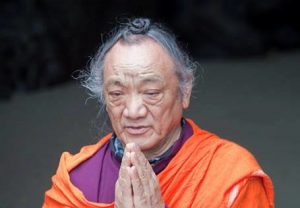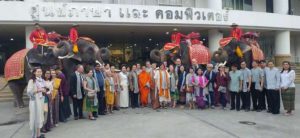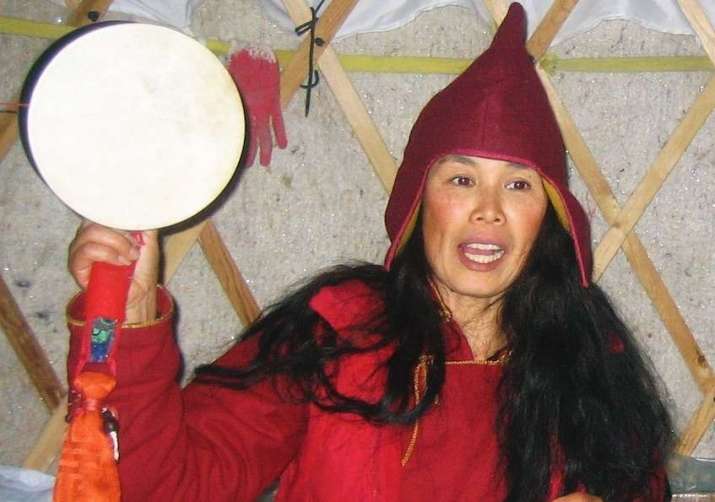
While I applaud the expanded reach of Buddhism thanks to rinpoches who give empowerments and transmissions globally, pre-modern Buddhism in the Vajrayana world rarely saw teachers who ever left their country’s borders. These teachers would retain a small group of devoted and experienced students to whom they could devote their precious time. In a globalized world this is not so easy to do physically. However, many Buddhist masters today take advantage of the Internet to maintain an intimate and personal teaching format. Chöying Khandro is among such teachers.
Based in Oregon, Chöying Khandro leads a global sangha that practices online for most meetings. She is the holder of the Ear-whispered Lineage (nyen-gyu) of the wisdom dakini Machig Labdron (1055–1149). She was conferred the authority to teach by the Ninth Jetsün Dampa Khalkha Rinpoche (1933–2012), who was recognized as the ninth incarnation of Jetsun Dampa Khutuktu (1635–1723) and served as the head of the Mongolian sangha.
In 2011, Chöying completed the 108 Spring Wandering Retreat, the culmination of all the practices in the Ear-whispered Lineage (it took her more than four months and three weeks—or 108 days and three sets of seven days). The retreat consisted of practicing Chö in challenging places such as wild springs and charnel grounds, where spirits dwell. “This is one of the unique qualities of Chö practice, willingly exposing oneself to fear and hope in difficult circumstances, like going into a charnel ground. We must allow fear to come up and see its true nature,” she told me in an online interview.
The Ear-whispered Lineage has both the oral and institutional aspects: “It is a living transmission like the current of a river which flows from the source, from the awakened source to lineage masters over the centuries, and it has been kept purely without interruption,” she said.
“These lineages are those of wandering yogis and yoginis who have practiced Chö in retreat outside of an institutional framework. The tradition emphasizes transmission in an intimate or personal manner between a master and a small number of disciples. The important things are transmitted directly and orally from master to disciple, not through books. This lineage presents us that possibility in the 21st century.”
Preserving this tradition is of urgent importance, as it was on the verge of disappearing in the early 20th century.
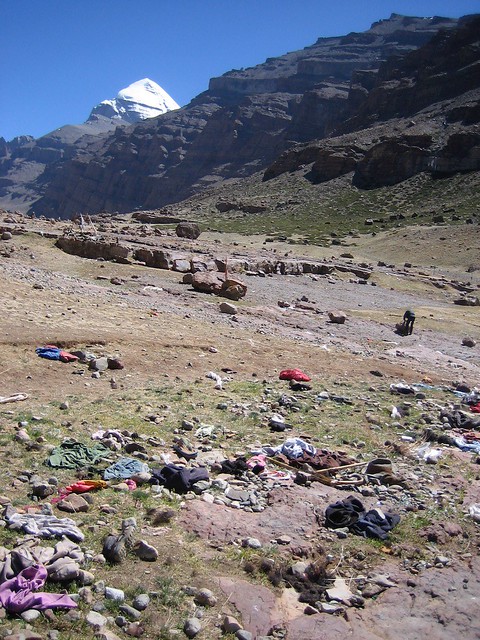
Image courtesy of Melissa Noble
Describing the role of personal authenticity in moving toward freedom and wisdom, Chöying explained: “Personal authenticity is everything that makes and everything allows freedom and awakening possible. It’s about ‘what is true for me in any given moment?’ Personal authenticity is also our responsibility to awaken to our deepest dimension and live to our fullest potential. To me I feel that personal authenticity is given but then lost over our lifetimes. On the spiritual path we are recovering that authenticity. It’s similar to the classical classification of the Mahamudra journey. For example, we talk about the Base, Path, and Result. The base is the same, Buddha-nature, innate freedom but it became obscured, so the path becomes the unveiling of the obscurations, becoming more and more authentic, close to freedom.”
“In my early days,” Chöying related, “my life was full of unsatisfactory and unfulfilled pursuits that led to suffering, driven by ego. I was not really living my life authentically. For example, at times in my life, when I was overwhelmed by the suffering I was enduring. This was the nature of life but I struggled against it, and ended up losing the correct perspective on things like compassion, Buddha-nature, the auspiciousness of our precious human lives. I felt my path was leading me toward more and more bondage.”
Indeed, many events in Chöying’s life were painful and challenging. She contracted hepatitis during a period of receiving transmissions in Dharamshala, went through a divorce, and lost her son when he was 16. “Machig Labdron said that disturbance and adversaries are glorious blessings on the path. Despite our tendency to fight against difficulties and challenges in life, we spiritual seekers are encouraged to consider difficulties as a powerful source of personal growth and ‘spiritual resilience,’ if I may use that term. This is the very practice we need to do. In our advanced practice, we welcome, face, and transform challenges by bringing them to the path through various techniques,” she said.
Chöying listed the following techniques: “We reflect on the lives of great beings, of the eminent masters, spiritual seekers, and of course, Shakyamuni Buddha himself—all of those great beings that had willingly faced hardships and come out as shining stars. They are our inspiration for spiritual growth.” Furthermore, we must cultivate love and compassion toward those who share our difficulties, and make a resolve to awaken for them. Finally, we must “hold fast our belief that our fundamental nature is never destroyed by external circumstances of turmoil, turbulence, and challenge, no matter how difficult we feel them to be, in order to go through.”
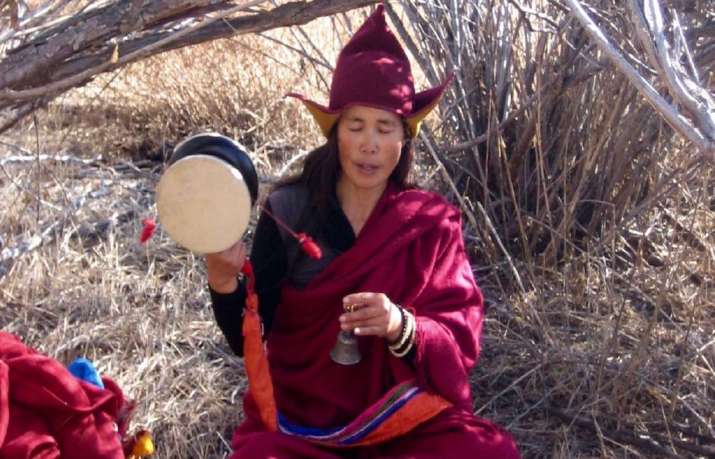
“Even while engaging in spiritual practice for the sake of freedom, we have to look deeply into our own motivation. Are we moving closer to attaining a full embodiment of human potential, or is there a tendency to avoid or bypass aspects of our human lives?If we are avoiding something consciously or unconsciously, I don’t think we are living our own lives authentically and we are still bound by limited notions of human potential. In my example, if I don’t speak from my own experience, I feel inauthenticity in myself. The Dharma means for me only what we come to know as true based on our own experience, understanding, and realization, no matter how limited it may be at that point.”
For Chöying “personal authenticity” boils down to whether she is moving toward inner freedom. She wishes for us to ask whether or not any choice that we make brings growth in personal authenticity. That determines whether we are moving toward freedom or bondage. “If I feel more genuine and honest and stand in my own shoes or ‘walk the talk’ so to speak, I know I’m moving toward freedom. Even when feel inauthenticity, if I rest in the experience of my own inauthenticity genuinely and honestly, I still feel that I’m moving toward freedom.”
The ultimate question, for Chöying, is simple at heart: Is the life I’m living experienced truly meaningful or purposeful to me? This is a profound invitation to recover the relationship between your human self and True Thusness, Buddha-nature—the Great Mother.”
See more
Chöying Khandro (Dakini’s Whisper)
Chöying Khandro: The Journey of a Modern Day Yogini Traversing her Charnel Ground (Dakini’s Whisper)







